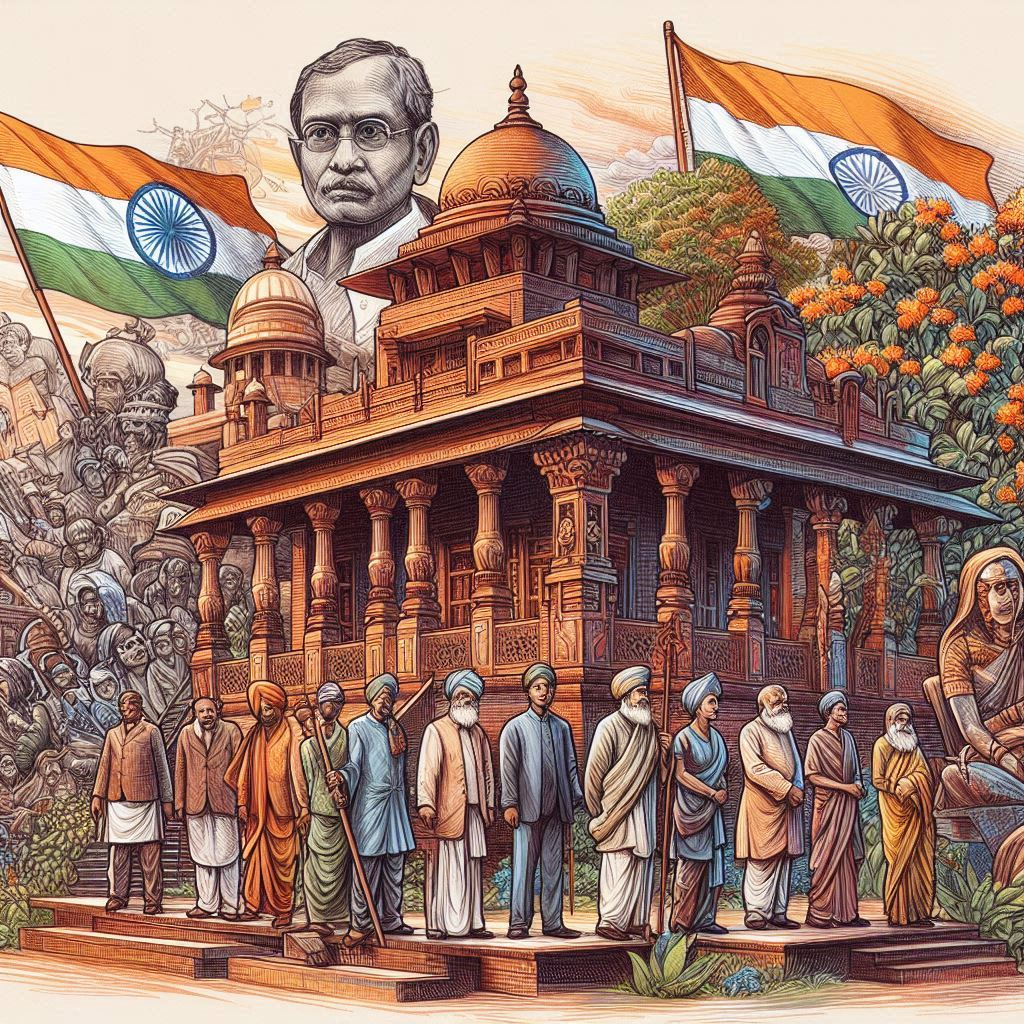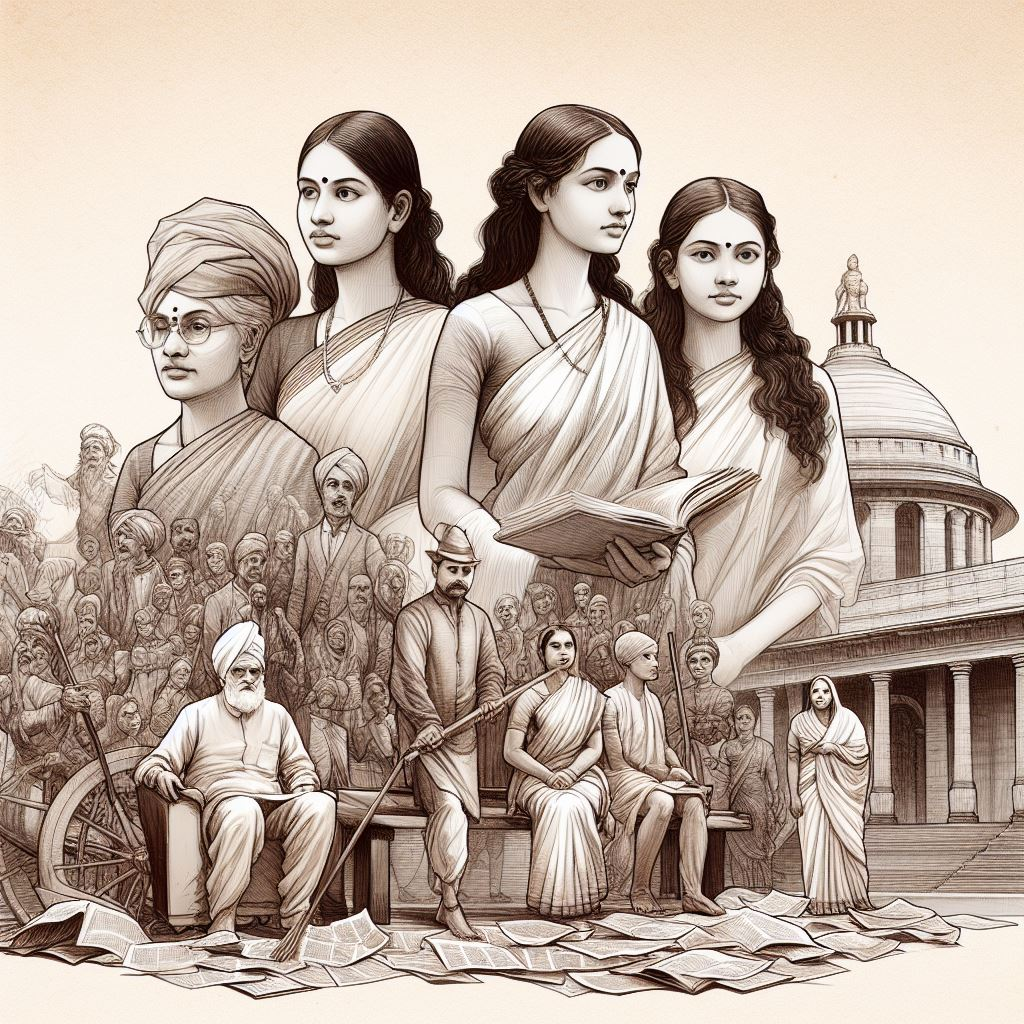Fundamental Duties
The original constitution of India contained only the fundamental rights and not the fundamental duties. The Constitution’s architects primarily focused on establishing the State’s responsibilities through the Directive Principles of State Policy. It wasn’t until 1976 that fundamental duties were integrated into the Constitution, with an additional duty being introduced in 2002.

The concept of Fundamental Duties in India’s Constitution draws inspiration from the former Soviet Union’s Constitution. Interestingly, most major democracies including the United States, Canada, France, Germany, and Australia don’t explicitly include citizens’ duties in their constitutions. Among democratic nations, Japan stands relatively unique in having constitutionally defined citizen duties. In contrast, socialist nations traditionally emphasized both rights and responsibilities of their citizens equally.
The Soviet Constitution specifically emphasized that citizens’ rights were inherently linked to their obligations and duties. During India’s internal emergency period (1975-1977), the need for fundamental duties became apparent, leading the Congress Party to establish the Sardar Swaran Singh Committee. This committee advocated for including a dedicated chapter on citizen duties in the Constitution, emphasizing that citizens should recognize their responsibilities alongside their rights. The central government implemented these suggestions through the 42nd Constitutional Amendment Act (1976), which introduced Part IVA, consisting of Article 51A, outlining ten fundamental duties for citizens.
LIST OF FUNDAMENTAL DUTIES
The Fundamental Duties are incorporated in Article 51A of the Constitution of India. This article mentions that it shall be the duty of every citizen of India:
- (a) to abide by the Constitution and respect its ideals and institutions, the National Flag and the National Anthem;
- (b) to cherish and follow the noble ideals that inspired the national struggle for freedom;
- (c) to uphold and protect the sovereignty, unity and integrity of India;
- (d) to defend the country and render national service when called upon to do so;
- (e) to promote harmony and the spirit of common brotherhood amongst all the people of India transcending religious, linguistic and regional or sectional diversities and to renounce practices derogatory to the dignity of women;
- (f) to value and preserve the rich heritage of the country’s composite culture;
- (g) to protect and improve the natural environment including forests, lakes, rivers and wildlife and to have compassion for living creatures;
- (h) to develop scientific temper, humanism and the spirit of inquiry and reform;
- (i) to safeguard public property and to abjure violence;
- (j) to strive towards excellence in all spheres of individual and collective activity so that the nation constantly rises to higher levels of endeavour and achievement; and
- (k) to provide opportunities for education to his child or ward between the age of six and fourteen years. This duty was added by the 86th Constitutional Amendment Act, 2002.
FEATURES
If we closely look at the list of fundamental duties mention in the constitution of India, we can enlist the following features of these:
- These duties encompass both moral and civic obligations. For example, while honoring freedom struggle ideals represents a moral duty, showing respect for national symbols reflects civic responsibility.
- These responsibilities reflect traditional Indian values, cultural practices, and religious principles, essentially codifying behaviors intrinsic to Indian society.
- While certain Fundamental Rights apply to all individuals within India, Fundamental Duties specifically apply only to Indian citizens.
- Similar to Directive Principles, these duties aren’t legally enforceable through courts and lack direct legal sanctions. However, Parliament retains the authority to enforce them through legislation.
CRITICISM
- The list of duties is not exhaustive as it does not cover other important duties like casting vote, paying taxes, family planning and so on. In fact, duty to pay taxes was recommended by the Swaran Singh Committee.
- Some of the duties are vague, ambiguous and difficult to be understood by the common man. For example, different interpretations can be given to the phrases like ‘noble ideals’, ‘composite culture’, ‘scientific temper’ and so on.
- They have been described by the critics as a code of moral precepts due to their non justiciable character. Interestingly, the Swaran Singh Committee had suggested for penalty or punishment for the non-performance of Fundamental Duties.
- Their inclusion in the Constitution was described by the critics as superfluous. This is because the duties included in the Constitution as fundamental would be performed by the people even though they were not incorporated in the Constitution.
5. The critics said that the inclusion of fundamental duties as an appendage to Part IV of the Constitution has reduced their value and significance. They should have been added after Part III so as to keep them on par with Fundamental Rights.
SIGNIFICANCE & Conclusion
The significance of Fundamental Duties in the Indian Constitution extends far beyond their symbolic value. At their core, these duties serve as a powerful reminder that citizenship is a two-way street – while we enjoy our constitutional rights, we must also uphold our responsibilities towards our nation and fellow citizens. When courts examine laws, they often consider whether these laws align with fundamental duties, particularly in relation to Articles 14 and 19, helping establish constitutional validity. These duties act as a crucial deterrent against destructive behaviors and anti-national activities, such as vandalizing public property or disrespecting national symbols. Moreover, they foster a sense of collective responsibility and national unity, transforming citizens from passive observers into active participants in India’s progress. What makes them particularly relevant is that Parliament has the authority to create laws enforcing these duties, giving them practical significance beyond mere constitutional ideals. This was precisely why H.R. Gokhale, the Law Minister at the time, advocated for their inclusion – as a stabilizing force in society, especially after witnessing how certain groups had shown disregard for the established legal order during the emergency period. In essence, these duties serve as guiding principles that help shape responsible citizenship and contribute to the nation’s overall development and stability.
H.R. Gokhale, the then Law Minister, gave the following reason for incorporating the fundamental duties in the Constitution after twenty-six years of its inauguration: ‘In post independent India, particularly on the eve of emergency in June 1975, a section of the people showed no anxiety to fulfil their fundamental obligations of respecting the established legal order. The provisions of chapter on fundamental duties would have a sobering effect on these restless spirits who have had a host of anti-national subversive and unconstitutional agitations in the past’.


